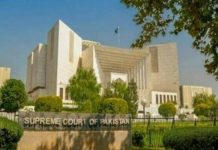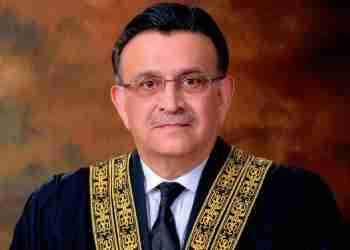ISLAMABAD, May 02 (NNI): The Supreme Court has rejected the government’s request to vacate the stay order against the enforcement of the Supreme Court (Practice and Procedure) Act, 2023, declaring that the judiciary has reservations about it.
The Supreme Court on Tuesday took up a plethora of petitions challenging the new law, aimed at curtailing the powers of the chief justice of Pakistan (CJP).
The eight-judge larger bench led by CJP Umar Ata Bandial dismissed Pakistan Bar Council’s request to constitute a full court to hear the petitions and also to remove Justice Mazahir Naqvi from the bench.
Earlier, Attorney General for Pakistan Mansoor Usman Awan met Prime Minister Shehbaz Sharif at PM House for consultations ahead of the hearing at the Supreme Court.
PPP’s counsel Farooq H Naek said, “This is the first time that the implementation of a bill has been stopped even before it was passed.”
Talking to journalists outside the apex court, Naek said the Constitution had allowed the Parliament to legislate. “If anyone challenges this bill, he will have to explain how this bill is against the public interest,” he pointed out.
“Let’s see what decision comes from the Supreme Court. The bill should have been first challenged in the High Court and then brought to the Supreme Court,” he added. He also stated that the Parliament had passed Supreme Court Practice and Procedure Bill using Article 199 of the Constitution.
Action on the bill was pre-emptively frozen by the apex court even before it became law last month.
The law provides for taking away the individual authority of the chief justice to initiate suo motu proceedings and unilaterally form benches and vests them in a panel comprising the CJP and two senior-most Supreme Court judges. It also calls for the right to appeal suo motu decisions.
An eight-member larger bench comprises CJP Umar Ata Bandial, Justice Ijazul Ahsan, Justice Munib Akhtar, Justice Sayyad Mazahar Ali Akbar Naqvi, Justice Muhammad Ali Mazhar, Justice Ayesha Malik, Justice Syed Hasan Azhar Rizvi and Justice Shahid Waheed heard the petitions.
The number of petitions challenging the Act has grown to four after another plea was filed on Tuesday. Advocate Mudassar Hassan submitted the latest petition praying the law was against Article 191 of the Constitution. Earlier petitions were filed under Article 184(3) of the Constitution by Advocate Muhammad Shafay Munir, Raja Amer Khan, Chaudhry Ghulam Hussain and others.
The draft law was initially passed by both houses of Parliament in March and sent to the president for his assent. However, the president had returned it unsigned, saying the proposed law travelled “beyond the competence of parliament”. The bill was subsequently adopted by a joint session of parliament on April 10 — albeit with some amendments.
Meanwhile, the top court — while hearing the three petitions challenging the then-bill — in an “anticipatory injunction” on April 13, barred the government from enforcing the draft law, saying the move would “prevent imminent apprehended danger that is irreparable” as soon as it became an act of parliament.
The ruling coalition government was swift to reject the apex court’s ruling and on April 19 the president again refused to give his assent and sent the draft law back to Parliament.
Despite this, the bill technically became an act of parliament on April 21 under Article 75(2) of the Constitution, and despite the court’s order halting the law’s implementation, the National Assembly Secretariat formally asked the Printing Corporation of Pakistan (PCP) to publish it in the official gazette. NNI








































